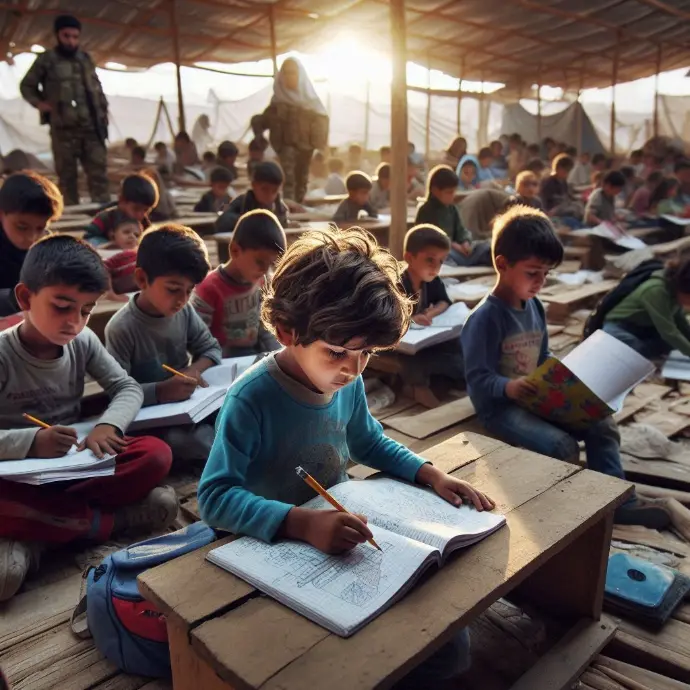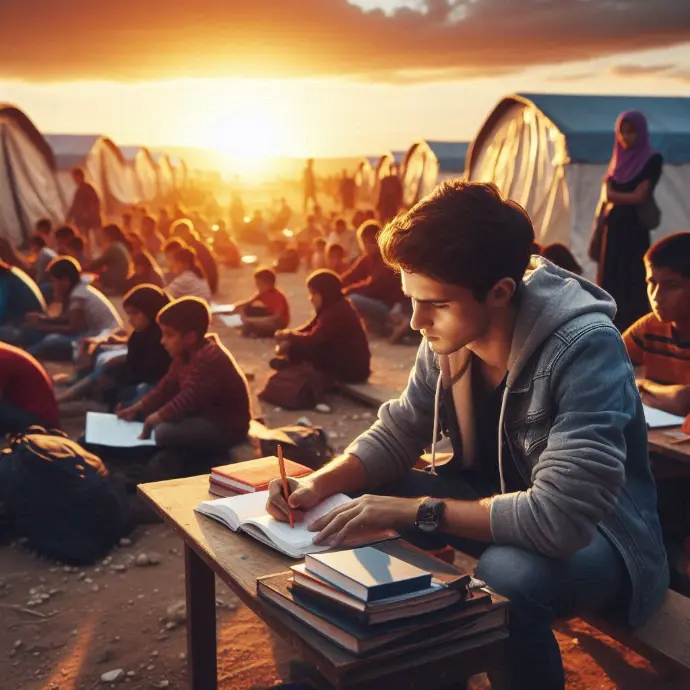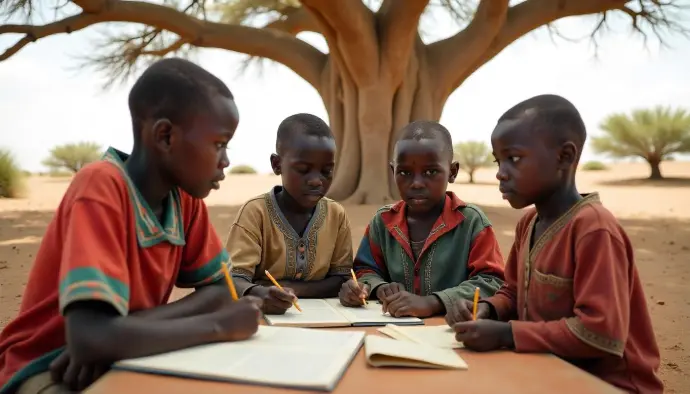Dive into our comprehensive exploration and in-depth analysis of global human rights. Discover how education is changing lives in refugee camps in our feature article "Classrooms Without Borders: The Impact of Education in Refugee Camps." Get ready to discover the transformative impact education has on these communities. Don't miss your chance to be part of this change!
Introduction
Forced displacement and the refugee crisis represent one of the most pressing challenges facing the international community today. According to the United Nations High Commissioner for Refugees (UNHCR), the number of forcibly displaced people globally will reach a record 120 million in 2024 due to conflict and violence. This phenomenon, caused by armed conflict, persecution, and massive human rights violations, has generated a humanitarian crisis of alarming proportions, with serious repercussions on the lives of millions of people around the world.
Refugee camps, which often emerge in response to these crises, become temporary homes for thousands of families forced to leave their homes in search of safety and protection. These communities face precarious living conditions, limited access to basic services, and a lack of long-term prospects, which has a devastating impact on the well-being and development of individuals, especially children and young people.
Given this situation, it is crucial to analyze the fundamental role that education plays in the lives of refugees and how it can help mitigate the adverse effects of forced displacement and foster hope and empowerment in a crisis environment.
In humanitarian crisis contexts, education takes on inestimable value, not only as a means of acquiring knowledge and skills, but also as an essential element in preserving the dignity, hope, and resilience of those affected. Education in situations of forced displacement not only provides learning opportunities but also offers a sense of normalcy, emotional stability, and a space for creative expression and personal development.
Furthermore, education in humanitarian crisis contexts plays a fundamental role in protecting children and young people by providing them with a safe environment where they can learn, play, and receive emotional support. It also contributes to preventing child recruitment, child marriage, and other forms of exploitation, while promoting social cohesion and peaceful coexistence in communities affected by forced displacement.
On the other hand, education in crisis situations also represents an investment in the future, as it provides refugees with the necessary tools to rebuild their lives, contribute to the development of their host communities, and ultimately participate in the reconstruction of their home countries once conditions allow.
The impact of education in refugee camps is significant and multifaceted. First, education provides refugee children and youth with the opportunity to develop cognitive, linguistic, and social skills, laying the foundation for their personal growth and active participation in society. It also provides them with the necessary tools to overcome the difficulties they face and gives them hope to build a better future.
Furthermore, education in refugee camps has a positive impact on students' mental and emotional health by providing them with a structured, supportive, and nurturing environment that allows them to process traumatic experiences and strengthen their emotional resilience. This therapeutic dimension of education takes on crucial relevance in environments where trauma and stress are pervasive.
Another key aspect of the impact of education in refugee camps lies in its ability to break the cycle of poverty and marginalization by offering students the opportunity to acquire the skills necessary to access employment opportunities and contribute to the sustainable development of their communities.
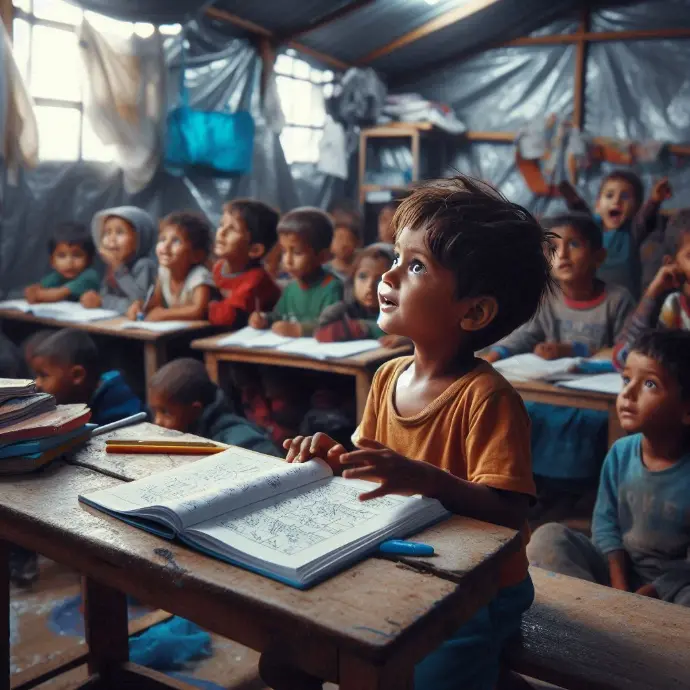
Refugee Camp Context
Today, refugee camps have become a widespread reality in many regions of the world, providing temporary refuge to people fleeing armed conflict, persecution, and natural disasters. According to the United Nations High Commissioner for Refugees (UNHCR), there are currently more than 43.4 million refugees worldwide, approximately 40% of whom are under the age of 18.
These camps, which are mostly overcrowded, face significant challenges in providing basic services, such as housing, food, healthcare, and education. Lack of resources, poor infrastructure, and uncertainty about the length of stay in the camps create an extremely difficult environment for refugees and their families. The current situation in refugee camps poses a number of challenges and difficulties that directly affect refugees' access to education, which in turn impacts their long-term development.
Access to education for refugees faces multiple barriers that hinder their development and well-being. Lack of resources, instability, constant displacement, and language barriers are just some of the obstacles refugee children and youth face in their pursuit of education.
The lack of adequate educational infrastructure in refugee camps, including schools, educational materials, and trained teachers, further hampers access to education. Furthermore, the need to work to support families, discrimination, and trauma stemming from past experiences also contribute to the difficulty of accessing education.
These barriers not only affect access to education but also negatively impact the mental health and overall well-being of refugees, perpetuating a cycle of disadvantage and marginalization.
Despite the challenges, various educational organizations and programs have dedicated themselves to providing learning opportunities in refugee camps. These initiatives seek to overcome existing barriers and provide hope and empowerment through education.
Some of these organizations offer formal educational programs, while others focus on vocational training, psychosocial support, and practical skills training. Through the implementation of innovative educational technologies, such as mobile classrooms and online platforms, they seek to expand access to education in crisis settings.
The positive impact of these educational programs goes beyond knowledge acquisition, as they contribute to refugees' resilience, self-esteem, and personal development. Furthermore, education in refugee camps plays a critical role in preparing for reintegration and building a sustainable future, both for individuals and for communities as a whole.
Education in refugee camps not only has an academic impact but also plays a crucial role in the psychosocial well-being of children and youth who have experienced traumatic situations. The structured routine provided by education gives them a sense of normalcy and stability in an otherwise chaotic and precarious environment. Furthermore, interaction with other students and teachers offers them a safe space to process their experiences, express emotions, and develop social skills critical to their emotional development.
Education also acts as a catalyst for resilience, providing refugee children and youth with a sense of hope and a path to a better future. It gives them the opportunity to acquire new skills, knowledge, and perspectives that will allow them to contribute positively to their host communities in the future. This empowerment through education not only benefits individuals but also has a positive impact on the social fabric and cohesion of refugee camps, laying the foundation for a more stable and prosperous environment.
Furthermore, education offers refugee children and youth the ability to process and understand their own situation, as well as that of their families, allowing them to develop greater resilience and adaptability to face present and future challenges. By providing them with a sense of purpose and meaning, education helps them overcome trauma and envision a more hopeful future, which significantly contributes to their psychological and emotional well-being amid difficult circumstances.
The Role of Education in the Protection of Human Rights
Education plays a critical role in empowering people in forced displacement settings, such as refugee camps. By providing access to education, refugees are given the opportunity to acquire knowledge, skills, and perspectives that enable them to participate more actively in society. This helps them regain a sense of normalcy, maintain hope, and build a more promising future, despite the adverse circumstances they find themselves in.
Education in refugee camps not only provides academic knowledge but also fosters personal development and self-esteem. By learning new skills and discovering new ideas, refugees can feel empowered to face the challenges they face. Furthermore, education can serve as a means of preserving refugees' culture and identity, contributing to their emotional and psychological well-being in an environment that can often feel hostile and alienating.
It is important to recognize that access to education in refugee camps not only benefits individuals but can also have a positive impact on the entire community. By offering educational opportunities, the development of skills and knowledge is encouraged, which can be applied to improve conditions within the camp and ultimately contribute to long-term progress and stability.
Education plays a crucial role in preventing violence and extremism in settings of forced displacement. By providing access to quality education, negative influences and factors that could contribute to the radicalization of young refugees can be counteracted. Education not only provides academic knowledge but also promotes values of respect, tolerance, and mutual understanding, which are fundamental to peaceful coexistence and conflict prevention.
Furthermore, education can offer young refugees a sense of purpose and belonging, reducing their vulnerability to recruitment by extremist groups. By providing them with opportunities to develop their skills and perspectives, it offers them a constructive alternative to participating in violent or extremist activities. In this sense, education is not only a tool for personal development but also an effective strategy for building safer and more peaceful societies.
It is crucial that education in refugee camps not only focus on academic aspects but also incorporate programs and activities that promote peaceful conflict resolution, intercultural dialogue, and mutual understanding. These initiatives contribute significantly to the prevention of violence and extremism, while strengthening social cohesion and the integration of refugees into their host communities.
Education in refugee camps offers the opportunity to promote inclusion and diversity, while fostering greater understanding among different ethnic, cultural, and linguistic groups. Creating educational environments that value and celebrate diversity contributes to building more inclusive and equitable societies, both within the camps and in host communities.
It is critical that educational programs in refugee camps be sensitive to the specific needs of each group, including women, children, people with disabilities, and other minorities. Including diverse perspectives in the curriculum and extracurricular activities not only enriches the educational experience but also promotes equal opportunities and respect for the human dignity of all refugees.
Furthermore, fostering inclusion and diversity in educational settings lays the foundation for building more cohesive and resilient societies. Education plays a fundamental role in promoting peaceful coexistence and mutual understanding, laying the foundation for reconciliation and harmonious coexistence between different groups in situations of forced displacement.
Challenges and Overcoming Challenges in Refugee Education
Education in refugee camps presents unique challenges, as resources are often limited and conditions are often precarious. However, despite these difficulties, innovative methods have been implemented to provide quality education. For example, the use of mobile classrooms, educational technology such as tablets and mobile devices, and distance learning through online programs have proven effective in delivering educational content in humanitarian crisis contexts. These innovative approaches not only provide access to education but also foster resilience and hope amid adversity.
Furthermore, non-governmental organizations and humanitarian agencies have implemented programs that integrate education with psychosocial support, arts, and recreation, recognizing the importance of addressing students' emotional needs in crisis situations. These initiatives not only promote cognitive development but also contribute to the overall well-being of refugee children and youth.
At a time when education is threatened by conflict and displacement, the implementation of innovative resources and methods is critical to ensuring that refugees have access to meaningful educational opportunities that enable them not only to survive but also thrive amidst adverse circumstances.
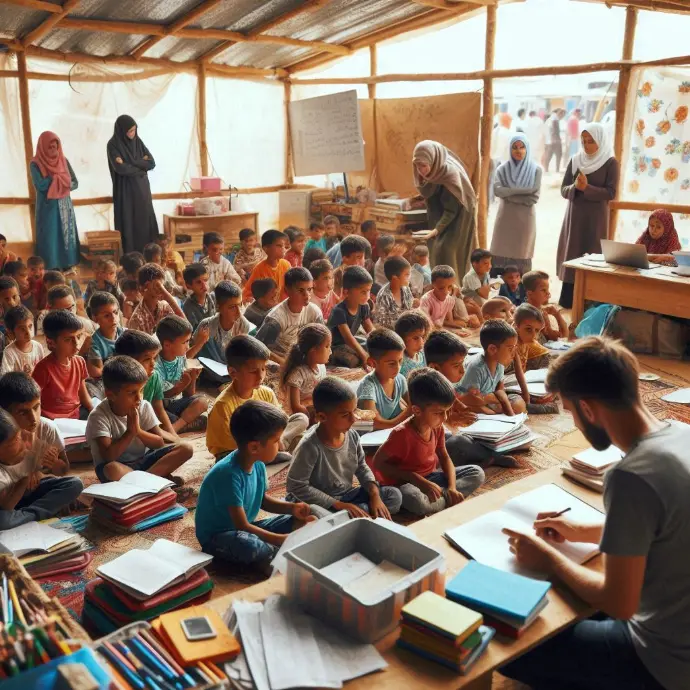
Long-Term Impact on Society and Sustainable Development
The contribution of education in refugee camps goes beyond the acquisition of academic knowledge. In the context of post-conflict reconstruction, education plays a crucial role in the transformation of war-affected communities. By providing access to education, the foundation is laid for stability and future progress. Refugee camps become hotbeds of hope, where education acts as a vehicle to foster peace, tolerance, and reconciliation. Furthermore, by offering a safe and structured environment, education promotes the resilience and empowerment of young refugees, preparing them to lead the reconstruction process in their home communities in the future. Investment in education in refugee contexts not only impacts the present but also lays the foundation for long-term sustainable development. By providing quality educational opportunities, human potential is being cultivated amidst challenging circumstances. This approach not only benefits individual refugees but also strengthens the capacity of communities to thrive in the future, thus contributing to global stability and development. Efforts to ensure education in refugee camps are not only a humanitarian issue but also have a significant impact on building a more equitable and sustainable world for future generations.
Conclusions
Refugee camps present a challenging environment where education can have a transformative impact on the lives of children and young people. Education not only provides knowledge and skills but also offers hope, emotional stability, and a sense of normalcy amid extremely difficult circumstances. Through educational programs tailored to the specific needs of refugees, resilience can be fostered and future generations empowered to build a better future.
Lack of funding, a shortage of trained teachers, language barriers, and lack of access to adequate educational resources are just some of the challenges facing education in contexts of forced displacement. To address these challenges, greater collaboration between governments, non-governmental organizations, and the international community is crucial, as is the development of innovative strategies to ensure that all children and young people in refugee situations have access to quality education.
The impact of education in refugee camps is undeniable. However, it is critical to address existing challenges and work together to strengthen education systems in contexts of forced displacement, ensuring that education remains a powerful tool for the protection and empowerment of refugees.

 IHRO NEWS
IHRO NEWS